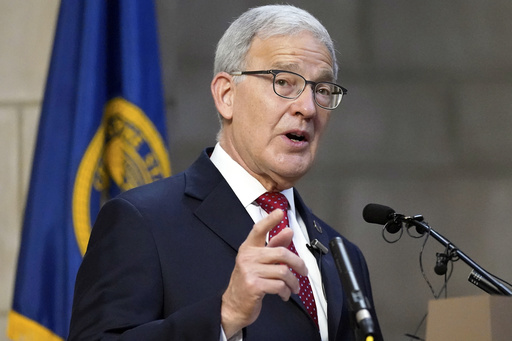
OMAHA, Neb. — On Wednesday, thousands of Nebraska residents with felony convictions are eagerly awaiting a decision from the Nebraska Supreme Court, which will determine if they can cast their votes in the upcoming highly competitive elections next month. This judgment comes in response to a lawsuit that aims to reinstate voting rights for individuals who have previously been convicted of crimes.
This case was brought to the forefront after the court considered arguments in August challenging the decision made by top state election officials. These officials opted to bypass a newly enacted law that seeks to restore voting rights to individuals following felony convictions. The timing of the judgment is critical, as it arrives just days before the registration deadline for the November 5 general election.
Brad Christian-Sallis, a director with the nonprofit organization Nebraska Table, expressed that many individuals with felony records are not only anxious about participating in the presidential election but also in state and local contests that directly influence their communities and education systems. “It’s absolutely caused a lot of anxiety and frustration,” he added.
State Secretary of State Bob Evnen instructed county election officials to refrain from registering felons to vote for the upcoming election, citing legal advice from Attorney General Mike Hilgers, who deemed the new law unconstitutional. This legal interpretation was sought by Evnen himself in July.
In retaliation, the American Civil Liberties Union (ACLU) has filed a suit on behalf of several Nebraskans who would be stripped of their voting rights due to Evnen’s directive. Given the time-sensitive nature of the upcoming election, the ACLU sought directly to escalate the matter to the Nebraska Supreme Court, which agreed to hear the case.
The ACLU claims that Evnen’s directive jeopardizes the voting rights of more than 7,000 residents, many of whom live within Nebraska’s 2nd Congressional District, an area that has shown unexpected electoral trends in the past. This district has previously awarded electoral votes to Democratic presidential candidates, including Barack Obama in 2008 and Joe Biden in 2020, despite Nebraska’s overall Republican leanings.
Civic Nebraska, an advocacy group dedicated to voting rights, has joined the lawsuit as a plaintiff with hopes of compelling state officials to implement the new voting rights law. Noah Rhoades, the group’s coordinator for voting rights restoration, expressed intentions to launch registration drives and disseminate information regardless of the court’s decision.
The law in question, known by its legislative bill number LB20, was passed earlier this year and aims to promptly restore voting rights to individuals who have successfully served their felony sentences. The attorney general’s opinion challenges the law on the basis that only the Nebraska Board of Pardons holds the authority to restore voting rights.
Pardons in Nebraska are difficult to attain, requiring individuals to wait a decade after their felony sentences before applying. Additionally, approvals for pardons are rare, as the Board comprises three members: Evnen, Hilgers, and Governor Jim Pillen, all of whom have publicly opposed restoring voting rights for those with felony convictions.
Hilgers’ opinion also invalidates a 2005 law that permitted individuals with felony convictions to regain voting rights two years following the completion of their sentences. If this law is found unconstitutional, this could potentially disenfranchise numerous Nebraskans who have been eligible to vote for nearly two decades.
While Evnen has claimed he will not remove individuals who registered to vote under the 2005 law from voter rolls, this assurance has done little to alleviate concerns for those who have legally participated in elections for years. “I spend a lot of time at the doors talking to voters and the community, and many folks were hopeful under LB20 but are now confused about their eligibility,” Christian-Sallis added.
These worries are reflective of broader national trends, as Republican-led states have a history of imposing restrictions on voting rights for those with felony convictions. In Florida, for instance, a 2018 constitutional amendment aimed to restore voting rights was overshadowed by subsequent legal actions against some who tried to vote. These actions led to confusion among individuals who believed their registration to vote was legitimate.
A recent report by The Sentencing Project highlighted that approximately 4 million Americans are denied their right to vote due to felony disenfranchisement laws. Christian-Sallis anticipates that the Nebraska Supreme Court will follow the example set by numerous other states that have moved toward restoring voting rights for individuals with felony records. “Ultimately, it’s about giving people the chance to engage in our democracy and reconnect with their communities in meaningful ways,” he concluded.
